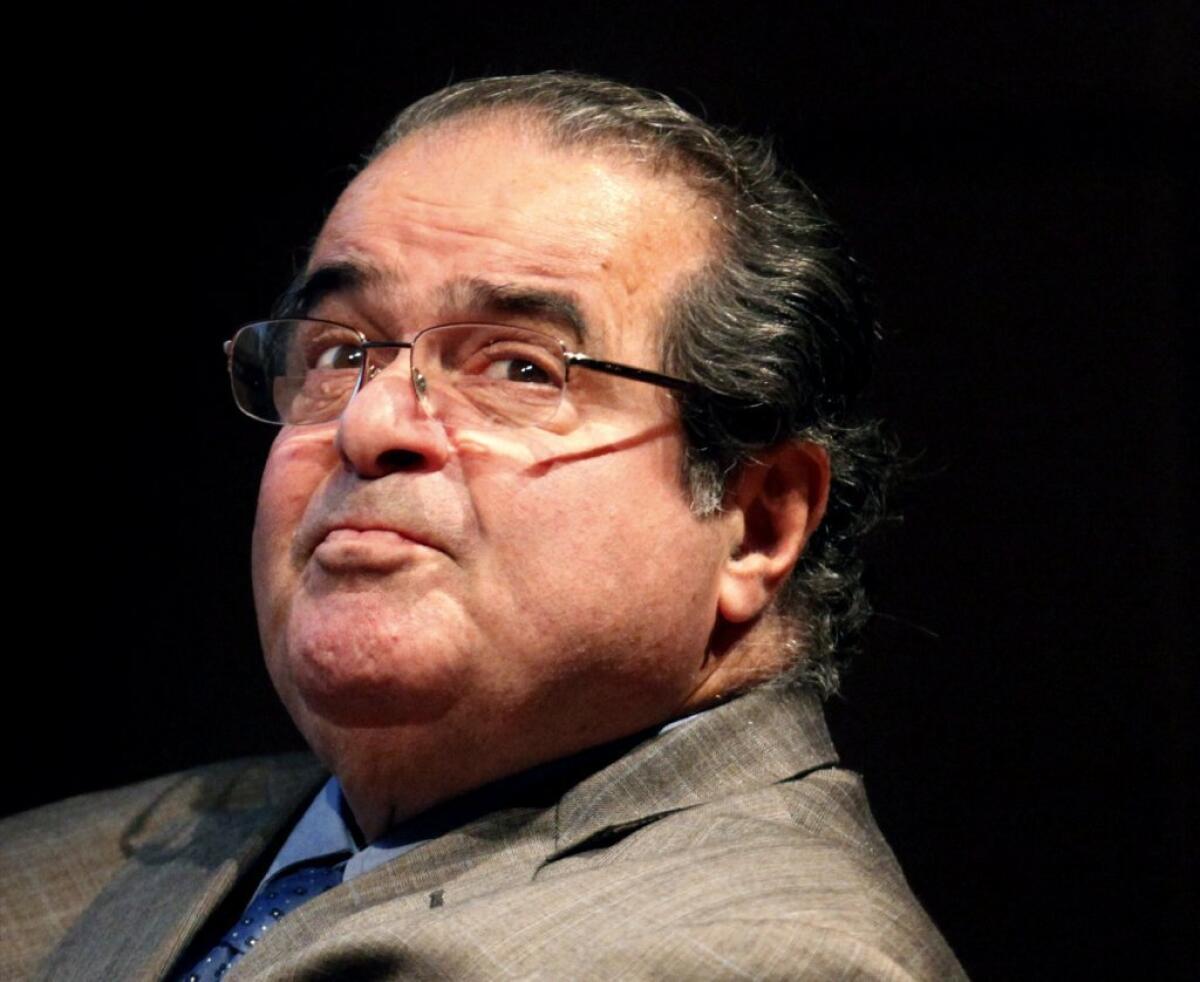Opinion: Reading the judicial tea leaves on same-sex marriage

Justice Antonin Scalia wrote this week that marriage-related rights must be “deeply rooted.”
Within the next couple of weeks, the U.S. Supreme Court will decide whether state bans on same-sex marriage violate the Constitution, but court-watchers can’t wait. Journalists and law professors have been reading various sorts of tea leaves -- from the justices’ opinions in other cases to their mood at public engagements -- to try to discern how the court might rule.
One tea leaf that has attracted attention is Justice Antonin Scalia’s bombastic opinion in an immigration case decided this week. The court turned aside a claim by a Fremont resident, Fauzia Din, that the State Department owed her a detailed explanation of why it rejected her Afghan husband’s visa application.
The decision was 5 to 4, but only two other members of the court -- Chief Justice John G. Roberts Jr. and Justice Clarence Thomas -- signed Scalia’s opinion, which rejected the idea that a constitutional right to marry extended to the right to live with one’s spouse in the United States.
The other two members of the majority, Justices Anthony Kennedy and Samuel A. Alito Jr., saw no reason to address that issue; even if such a right existed, Kennedy wrote, the State Department afforded Din due process by citing unspecified “terrorist activities” as a reason for the visa denial.
While it isn’t binding precedent, Scalia’s opinion is a fascinating window on his exasperation at the tendency of liberal jurists to discern (or invent) rights that aren’t explicitly guaranteed in the Constitution.
Scalia grudgingly acknowledged that the court had found a right to marry in the “liberty” protected by the Due Process Clause. But he asserted: “Even if we might ‘imply’ a liberty interest in marriage generally speaking, that must give way when there is a tradition denying the specific application of that general interest.”
Scalia cited a 1997 decision in which the Supreme Court ruled that the Constitution protected only those rights that are “deeply rooted in this nation’s history and tradition, and implicit in the concept of ordered liberty.” This seems like a preemptive strike against a holding that the right to marry includes the “specific application” of same-sex unions.
It’s hardly news that Scalia is likely to vote against a right to same-sex marriage. But the vehemence of his opinion in the visa case and its sense of grievance suggest that he may think (or know) that the battle on same-sex marriage is lost.
The other intriguing aspect of the Scalia opinion is that it was signed by Roberts. If the chief justice also believes that a right to same-sex marriage isn’t deeply rooted in history and tradition, it’s hard to see how he could endorse an argument for marriage equality based on the “liberty” protected by the Due Process Clause.
But that’s only one constitutional argument for same-sex marriage. The other is based on a different section of the 14th Amendment, the provision saying that no state shall “deny to any person within its jurisdiction the equal protection of the laws.”
When the Supreme Court struck down state bans on interracial marriage in 1967, it checked both the due-process and equal-protection boxes. Roberts could decide to check only one -- which would still amount to a vote for marriage equality.
During oral arguments in the case, Roberts put this question to the lawyer for the states with bans on same-sex marriage: “If Sue loves Joe and Tom loves Joe, Sue can marry him and Tom can’t. And the difference is based on their different sex. Why isn’t that a straightforward question of sexual discrimination?”
Under the Equal Protection Clause, distinctions based on gender must have an “exceedingly persuasive justification.” Roberts could find that bans on same-sex marriage lacked such a justification, even if gay marriage isn’t “deeply rooted in this nation’s history and tradition.”
In that case, his signature on Scalia’s opinion in the visa case might be seen as a consolation prize.
Twitter: @MichaelMcGough3
More to Read
A cure for the common opinion
Get thought-provoking perspectives with our weekly newsletter.
You may occasionally receive promotional content from the Los Angeles Times.











